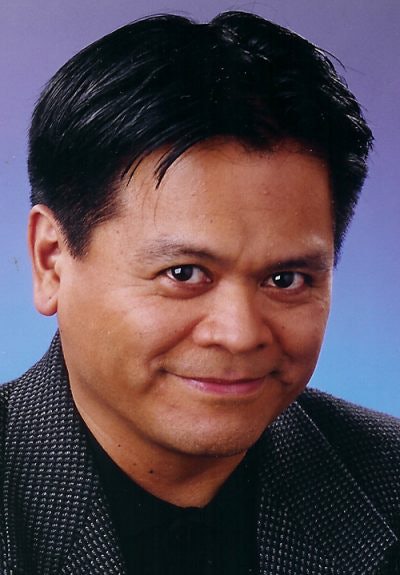The college radio station is where I learned to be me. Maybe that’s because the radio audience doesn’t really see me. I was just a voice. Just like on the page or screen, the words are my voice through you. So you don’t instantly reject them. They could be your thoughts. But listening to me is like me actually getting inside your ear. It’s more passively invasive. And then it all works on your imagination.
I’m thinking about this because I’m still in touch with my alma mater, mostly through the radio station. (The humor organization too, but the radio station most recently). Five years ago this year was the 75th anniversary of the radio station. This year, they didn’t do anything about the 80th because most of the folks who cared about it enough to celebrate were dead or dying.
 Emil Guillermo
Emil GuillermoOne person I met at the 75th reunion of the radio station was a fellow name Clark Johnsen. I sat in front of him at the Science Center lecture hall for an alumni discussion group. He saw me raising my hand and not being recognized. And then he saw me sit down, quietly. I kept raising it and sitting down, when failing to be recognized. Clark, whom I never met before, saw me in this repetitive loop— seeing me raise my hand and failing to be recognized then sitting down. Then he finally did something about it.
He gave me a nudge. Maybe it was more like a shove.
“Speak,” he said.
Then I did.
I made my point. Something about the history of the radio station and how the Civil Rights Act wasn’t passed until 1964, and how Asian Americans were held to ridiculous racist quotas until the Immigration Act of 1965, and that kept Asian numbers artificially low, and how considering all that, it’s not surprising why there were such little diversity at this gathering of alumni.
And then I turned to Clark, an older White male, and thanked him.
It was his act of affirmative action that helped me, a Filipino American of Asian descent to be seen and heard; and it enabled me to make my own act of affirmative action. Even to this day, I’ve come to see it as a two way street.
It was a subtler push than the one I got as a freshman many years ago when I was just a high schooler from San Francisco and I got that big fat letter from Harvard—the acceptance—practically a degree unto itself. I was the first in my family to go to a private college out-of-state on scholarship. I knew it was a big deal.
But getting a push 40 years later by Clark let me know, nothing ever really changes, unless people keep pushing all the time. And when people stop, so does the progress.
Clark Johnsen was an old-fashioned guy. He was a physics major at school and became a scientist who worked on things like cameras and telescopes that could see things in orbit and on Mars.
That meant he appreciated hearing and seeing things the way they are. And when he couldn’t, he developed tools that would help him do all that. No wonder he was also an audiophile. He wanted to hear the truth in recordings of the piano, the violin, the horn. Hence, his connection to the radio station. We didn’t really agree on politics or the things I usually write about. We didn’t even like the same music, I was in the Jazz and Rhythm and Blues department. But he was able to see what I needed the first time he met me. Just a little nudge.
Coincidentally, as I recall this story, the case that uses Asian Americans to topple Harvard’s successful and diverse admissions policies continues to make its way to the Supreme Court. And just last week, Harvard admitted an early admission class that was a relatively high 23.4 percent Asian American. It was barely a fraction of that in my day.
I thought of my moment at the radio reunion and wanted to thank Clark Johnsen.
Too late. Johnsen died from cancer back in April.
But the impression was made at the reunion. Whenever I hear the word “affirmative action” I now think of Clark and what it takes to break through and fill the silence with one’s voice. There’s nothing wrong with a push, well- intentioned and well-deserved, in the name of diversity.
Emil Guillermo is a journalist and commentator. You can follow him on Twitter @emilamok.
















